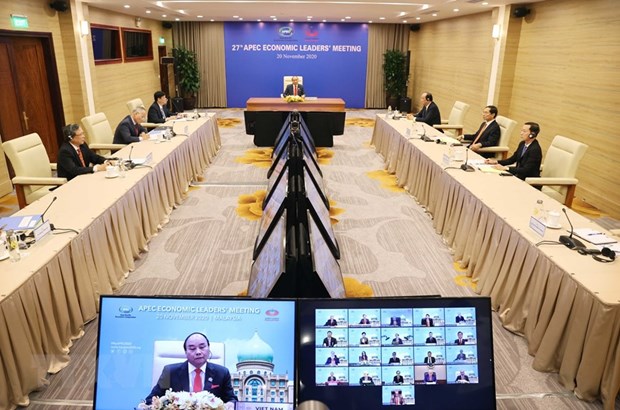Vietnam continues partnering with APEC for regional peace and stability: PM
Addressing the 27th APEC Economic Leaders’ Meeting on November 20, PM Phuc shared orientations to promote economic recovery and response to the COVID-19 pandemic in the near future.
He highlighted the need to uphold the spirit of cooperation and the sense of responsibility for the international community, firstly enhancing multilateral cooperation and making a balance between short-term actions and the settlement of medium- and long-term challenges in response to multiple crises at present.
As ASEAN Chair 2020, PM Phuc shared experiences and achievements of the ASEAN Community in general and Vietnam in particular in controlling the pandemic and dealing with socio-economic consequences.
About APEC’s cooperation orientations, he expressed his impression on Asia-Pacific socio-economic achievements after 25 years of pursuing the Bogor Goals. He also affirmed the task of inheriting the achievements and building a future together so that APEC could uphold its capacity to adapt to a changing world and an evolving regional architecture.
 |
| PM Nguyen Xuan Phuc attends the 27th APEC Economic Leaders' Meeting via video conference (Photo: VNA) |
The PM proposed APEC coordinate actions to control the pandemic, step up economic connectivity and ensure supply chains so that the Asia-Pacific region could continue to be a driving force during the economic recovery process.
He described comprehensive digital transformation as a new driving force for APEC to enhance its core values during the fourth Industrial Revolution.
APEC needs to lead Asia-Pacific to become an innovation and technological hub, develop digital human resources, strengthen connectivity and narrow development gaps, he said, adding that sustainable and inclusive development, response to non-traditional security challenges, particularly natural disasters, water resources and climate change, need to become new pillars of regional collaboration.
Accordingly, people and businesses should be placed at the centre of economic development and connectivity, the leader said, adding that APEC needs to help its member economies develop in a smarter, greener and more inclusive way.
At the meeting, leaders of member economies approved the APEC Putrajaya Vision 2040 and the Kuala Lumpur Declaration 2020.
Leaders said the APEC Putrajaya Vision 2040 will be achieved by pursuing three economic drivers: trade and investment; innovation and digitalisation; strong, balanced, secure, sustainable and inclusive growth.
With this outcome, the 27th APEC Economic Leaders’ Meeting completed the implementation of the initiative on building the Post-2020 APEC Vision proposed by Vietnam and adopted at the 25th APEC Economic Leaders’ Meeting held in the central city of Da Nang in November 2017.
Being aware of impacts and heavy losses caused by COVID-19 to the world and the region, APEC leaders expressed their profound sympathies with the losses of people as well as their gratitude to forces who have been on the front-line of the fight against the pandemic.
Leaders held that the recovery process will face risks amid the complicated developments of the COVID-19 pandemic. Therefore, leaders affirmed the need to promote economic stimulus packages, focus on transparent and sustainable fiscal policies, facilitate essential travelling of people, especially entrepreneurs, and create more new jobs.
Leaders emphasised the importance of strengthening trust, coordinating actions and promoting multilateral cooperation and seizing new opportunities on the basis of digital technology and connectivity.
The meeting highlighted the role of science and technology in controlling and coping with the pandemic, ensuring the fair access of all people to vaccines and essential medical products with high quality and reasonable prices.
Leaders shared their assessments on profound changes and major trends in the world and the region as well as APEC’s cooperation role in the shaping architecture.
While affirming the need to maintain an open and free trade and investment environment and a rules-based multilateral trade system, leaders promised to continue further promoting economic linkages, and comprehensive and digital connectivity in Asia-Pacific.
Many delegates were optimistic about the prospect of building an Asia-Pacific Free Trade Area. The meeting welcomed the Comprehensive and Progressive Agreement for Trans-Pacific Partnership (CPTPP) which is currently implemented and the Regional Comprehensive Economic Partnership (RCEP) Agreement which was signed on November 15.
At the end of the event, Prime Minister of New Zealand Jacinda Ardern officially received the role as the host of the 28th APEC Economic Leaders’ Meeting.

